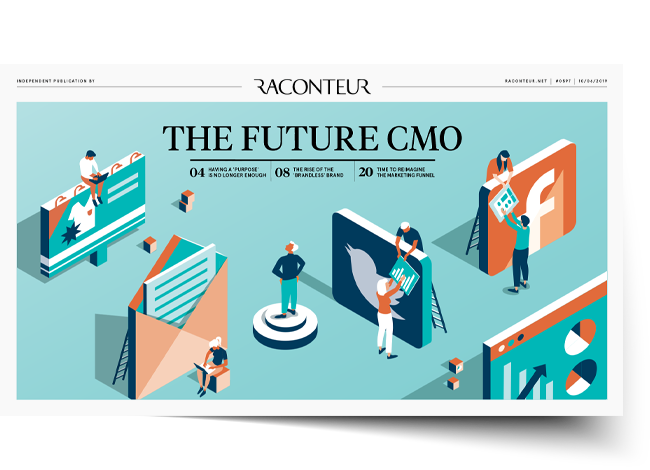How do you like your eggs in the morning? We like ours with a report.
A Chief Marketing Officer’s (CMO) role has never been as diverse as it’s expected to be for 2019, and onwards. With fluctuating trends, new technology, and a customer-centric attitude, the CMO needs to oversee a juggling act, while keeping a laser focus on how to take the brand forward.
Whilst “The Future CMO” report, brought to you by Infinity + Raconteur, is jam-packed full of insights, we’ve compiled 6 quickfire lessons to take on board you before your day begins.
The insight in this blog comes from The Future CMO, a report we have released alongside The Times and Raconteur. Download it for free here.  Get my copy
Get my copy
Cavemen creativity
“Tech and data are critical, but in the end, creativity is ultimately human. It’s like the invention of fire when man thought of rubbing two stones together to create a spark; that spark is human creativity.”
Mathilde Delhoume | Global Brand Officer, LVMH
Algorithms offer marketers ease of automation, but it’s important to recognise that there are drawbacks of this. Because they repeat what has been successful in the past they often overlook the need for creativity and innovative campaigns which end up fuelling long-term growth for brands.
Ultimately, the two work hand in hand together. Creativity and innovation help create long term growth, which ensures you stay relevant to your customer and also leave a legacy behind you.
Success stories in harnessing data
Remembering to use creativity in marketing is just the first battle. How to actually create it is a war in itself. Future CMOs are expected to understand the potential of data but also need to use creative thinking to turn this into a resonating story.
Homeland, Pret-a-Manger, and Vimto are brands already doing this and are discussed further in “The Future CMO” report, but one brand that harmonises the power of data and creativity successfully is Spotify.
By using data on over 140 million users, the music streaming service translates this into adverts that tell a unique story about users listening habits.

“[The campaign] Out-of-home gives that hyperlocality which gives those ‘aha’ moments to people. And it allows a digital community to feel connected in a physical way. We’re all seeing this and remembering this moment together.”
Seth Farbman | Chief Marketing Officer, Spotify
The new way to brand
It was once considered enough to pay for a celebrity advertisement, slap on fancy packaging, and sell your branded product in a few retailers. But, is this the case anymore? An increasing amount of brands aiming to go ‘brandless’, think Muji. Even mega brands, like Amazon, may be distinctly recognisable but still imbue their packaging with a toned-down design. With this in mind, does this mean the shift from brand to bland is increasingly more evident?
This trend now opens up the discussion of whether the traditional perception of branding is still important? How do brandless brands become brands? Try saying that ten times fast. According to Matt Holt, chief strategy officer at Digitas, it has more to do with how brands are built, rather than how they look or if they’re still important. In an age of distrust, many brands need to build themselves to been seen as trustworthy and transparent. To them, that is their branding, not fancy packaging and celebrity campaigns.
“Rather than the debate being about whether brands are still important, the actual questions at hand should be how we build brands nowadays, not if. And that's the exciting question.”
Matt Holt | Chief Strategy Officer, Digitas
Ignoring the crying baby
Whilst offering a unique experience is clearly quite crucial. It’s also equally as crucial to not become a slave to your customers changing needs. This according to Professor Eisngerich, Professor of Marketing at London’s Imperial College Business School.
“We always listen to the crying baby, we are always fire-fighting. But it is not always the vocal customers who are the most important.”
Professor Eisngerich | Professor Of Marketing, London’s Imperial College Business School
It becomes a balancing act of giving customers what they want versus what they need. This is something former boss of Apple, Steve Jobs, had a unique ability to do. Sensing what customers were going to need before they even realised it themselves gave the former Apple CEO a prophetic status amongst his peers.
Right hand, meet left hand
According to Forrester and Accenture, half of martech purchasing decisions happen outside of the marketing department. Ironic, no? The fact that the principal users of martech will be marketers, the decision to actually buy industry-related platforms is out of their control?
But, who is making these high-level purchase decisions? Enter the CIO. The ying to the yang of many CMOs.
By harmonising these two roles, a cohesive strategy is born. CMOS can share their knowledge of what’s required for exceptional customer experience, whilst CIOs can link up and complete it with the correct IT tools and platforms. Together, a technology strategy is born that’s right for the business, but more importantly the customer.
“CMOs need to work with their CIO colleagues to ensure new technology opportunities are understood and harnessed. Companies perform at their best when there is a high-level alignment. It’s a common but apt idiom in the business world for the right hand to know what the left hand is doing. The stronger that relationship, the greater the clarity both have and are able to effect change together.“
Mark Evans | Marketing Director, Direct Line Group
The hybrid CMO
As some Chief Marketing officers have wrangled the snake that is “omnichannel digital presence”, the new challenge they face is to become customer-centric. This according to Ann Higgins, managing director at Ogilvy Consulting EMEA. Because of the shifting priorities of this role, speculation is rife in the marketing industry as to whether the CMO’s role is still needed. Whilst organisations such as Coca-Cola and Hyatt have eliminated the role from their C-suite, should this the norm for everyone?
Marketing changes overnight. New channels emerge, and others die out. Consequently, this has a knock-on effect on the responsibilities a CMO holds. Adopting a Darwinian attitude isn’t a bad idea. Being able to adapt to survive could be the key to keeping the CMO position.
But what is this position going to look like? Higgins says that the CMO needs to be part marketer, part customer experience expert, part cross-silo diplomat, part technologist, and part organisational change agent. An exhausting challenge by the sounds of it.
Furthermore, Higgins describes the general sense of the CMO as being a “deer caught in the headlights” as they try to cope with adopting the role as the primary agent for driving growth in organisations.
Regardless of the puzzle that shapes the role of a CMO, their role remains the same.
“Whilst marketing has no doubt transformed, it is still about how brands resonate with audiences, which is more important than ever in a world where consumers are overloaded with information.”
Ann Higgins | Managing Director, Ogilvy Consulting EMEA
CMOs step up to the thought leadership plate
According to Edelman and Linkedin, only 14% of decision-makers consider the thought leadership they encounter as being “very good or excellent”.
Additionally, more than 50% of decision-makers say they use thought leadership as an important way to vet organisations they’re considering working with, and 49% had awarded business on the basis of good thought leadership.
But what constitutes good thought leadership, and, more importantly, who should be delivering it? Despite qualms regarding prospective clients viewing CMO thought leadership as “ a sneaky way to sell the product”, many industry-leading brands still believe in the CMO delivering thought leadership.
“ True thought leadership helps to cut through the jargon that’s often associated with the technology sector and provide a clear and relatable vision for the audience. The CMO is pivotal in driving this, both as a thought leader themselves and by setting an example for the rest of the organisation.”
Iris Meijer | Vodafone Business, Chief Marketing Officer
“CMOs have a critical role to play as thought leaders. Marketing now sits at the epicentre of business strategy for an organisation and the customer experience and engagement strategies a company deploys will be the difference between success and failure.”
Amanda St. L Jobbins | Chief Marketing Officer, Oracle
Let your day begin
Unpacking the role of the future CMO is not an easy feat, but it’s one worth paying attention to. With digital disruption, pop-up channels, and a cohesive working relationship with CIOs, it’s crucial that any future leaders pay attention to the lessons that matter.
Whilst you’ve just had the quickfire lessons before your cup of coffee, “The Future CMO” report is full of lots more.
Download your copy today.